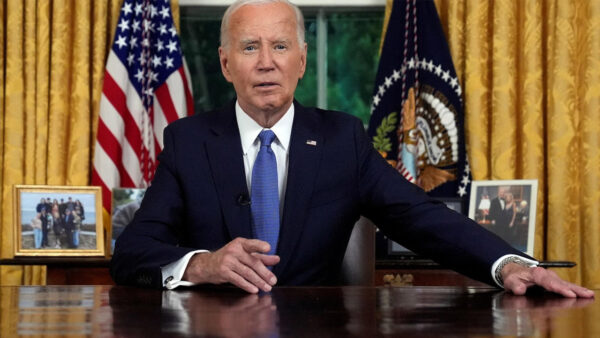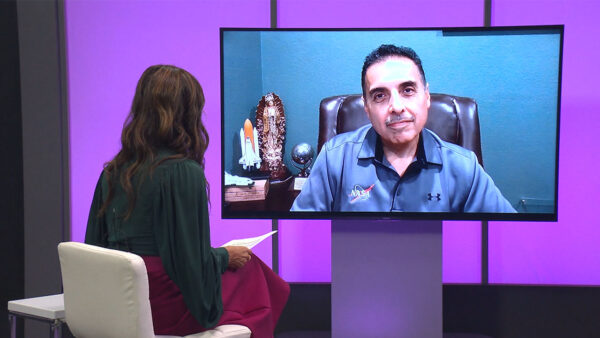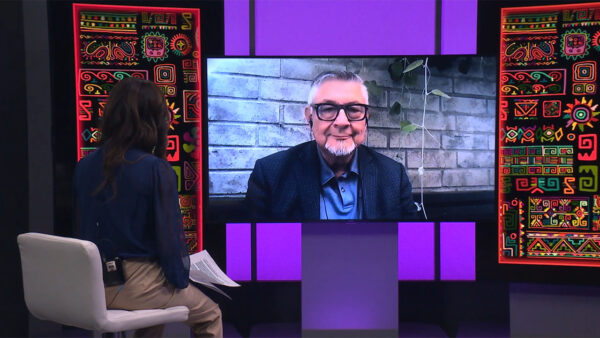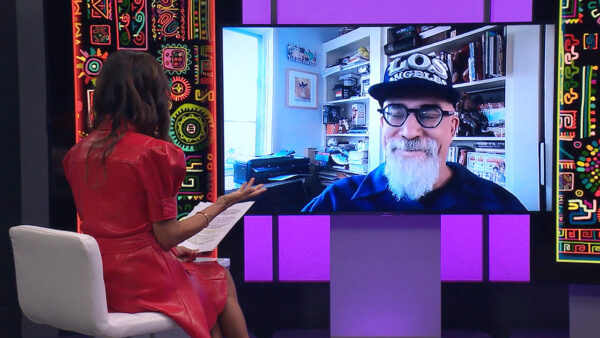A year after Governer Jan Brewer signed Senate Bill 1070 into law, some say the legislation was a step in the right direction when it comes to handling immigration in Arizona. Susan Bitter Smith, business owner and former Central Arizona Project president, and Jesse Hernandez, chairman for the Arizona Latino Republican Association, discuss its impact on our state.
José Cárdenas: Thank you for joining us. I'm José Cárdenas. It's been one year since Governor Jan Brewer signed S.B. 1070. Last week on "Horizonte," we talked to people who think the legislation was not the best way to handle immigration issues in Arizona. Tonight, we talk to supporters of S.B. 1070 and we'll get their perspectives on how it's affected our state. Joining me is Susan Bitter-Smith, a business owner and former president for the central Arizona project. And Jesse Hernandez, chairman for the Arizona Latino Republican association. Welcome back because you've been on our show to talk about these precise issues and a lot has happened since you were last on. Susan, let's start with you. The show we referred to last week, the assessment was that at a minimum, the passage of S.B. 1070, Governor Brewer signing of it, had a tremendous impact on state elections. Do you agree?
Susan Bitter-Smith: Oh, absolutely. No question it changed the dynamic of the governor's race and down the statewide races and it was the issue in legislative races in every district, and even popped up in congressional races, though to a lesser extent but legislative races were turning the tide by the 1070 vote.
José Cárdenas: And Jesse, there was a suggestion last week that one political impact of S.B. 1070 was it galvanized the Latino vote and produced perhaps another 100,000 voters in Arizona.
Jesse Hernandez: Correct. It did bring out the Latinos more so than at any time. And pulled it out in both aisles on the political spectrum. I felt that just from my group, we saw an increase of more conservatives coming out. So it was a positive move. There's an assumption that the increase in the Latino community was for the Democrats which I -- I personally thought it was more of the conservative principles.
José Cárdenas: What evidence do you have of that?
Jesse Hernandez: You know, quite frankly, in the group I represent, I have Democrats calling me and showing up for meetings, saying, look, I'm a Democrat. Like the blue dog Democrats but they agreed with the S.B. 1070 and supported it and said enough is enough. You have to keep in mind, Latinos it's not a monolithic group. We're diverse. The issues that face the fifth generation or fourth generation Latino is different from the person who the just came here from Mexico or quatemala or whatever. They were out here supporting S.B. 1070.
José Cárdenas: Within the Hispanic Republican groups there was some division. The last time we had you on the show, we had you opposite Somos Republicans, who is very much opposed to S.B. 1070 but they're a Republican voters.
Jesse Hernandez: That's correct. And it's like I said, we're not a monolithic group. But she speaks for a certain group in the Republican party but definitely not the majority. She's not been, you know, embraced that well in Arizona and as a matter of fact, there's groups trying to push those Republicans out. So she's not been embraced that well.
José Cárdenas: Susan, you're a business person. You've worked with businesses for a number of years. The sentiment is that this had a great cost for Arizona, right or wrong, whether it's a good legislation or not. It has a significant impact on the Arizona economy. Do you agree with that?
Susan Bitter-Smith: The hospitality industry was very concerned about 1070 and as things began to roll out, we saw a balancing, there were meetings that early on -- they were replaced for those who came to show support for 1070 and I think things are improving and some downfall was really because of the economic cycle. I think the business community in general supported the concept and the message 1070 was sending and I also think also they want the state legislature to be dealing with economics and jobs issues but I don't think for one second they backed away from the fact we need the borders secure and safe. Because that's good for business too.
José Cárdenas: If the impact was as big as people say, and we're talking billions of dollars, do you think it was worth the price?
Susan Bitter-Smith: I'm not sure it's a billion dollar number. I don't think it's that significant. At the end of the day, yes, because whatever negative impact was sent, the positive impact is it was a shot heard around the world. It changed the dynamic the conversation across the country about immigration. Members of congress in Minnesota or New Jersey who don't understand the reality of immigration crisises, I think now understand the border issues and know it's a big issue and raised the tone of the discussion federally, even today, the Obama administration say they're going to look at immigration reform. What that looks like, I don't know, but it does raise the issue.
José Cárdenas: If there was a cost, if the benefit was discussion, but no action, then was it a cost worth paying?
Susan Bitter-Smith: I don't think it would result in no action. People are so motivated on this topic and continue to be, elected officials who rode in on the 1070 wave last cycle, if they can't come back and say here's what we've done, not just what we said, I think there would be retribution.
José Cárdenas: Jesse, what are the benefits of 1070, given that its most significant provision, controversial one-on-ones, never went into effect.
Jesse Hernandez: I think the impact on SB 1070 is that it created the awareness on immigration and also lowered the playing field in the sense of jobs out there. I felt that 1070 brought an awareness what was going on. Unfortunately, the Latino communities are working hard but employers were taking advantage of them. I think, from that standpoint, people are realizing, look, here's a group who are being taken advantage of and quite frankly even on the political side. The Obama administration said one of the first things he was going to do was handle immigration and it control three branch of governments, and nothing was done.
José Cárdenas: You're talking about the political impact for Obama because he didn't deliver on promises and people feel that way.
Jesse Hernandez: And then you have Louis Gutierrez, the democrat, he's upset and trying to hold the president's feet to the fire. It has an impact politically at the national level and will trickle down to the state level.
José Cárdenas: Why do you think it is, though, that -- the momentum that S.B. 1070 seemed to have generated in the other states for similar legislation seems to have slowed almost to a crawl?
Jesse Hernandez: I think the reason it slowed down is that they're taking a wait and see attitude. I think the interest is out there. I believe there's about 25 states that have entertained similar type legislation. But I really believe they're -- what happens, we went to the ninth circuit and it didn't go too favorably and now we have to wait for the Supreme Court. If they rule in favor of 1070, the momentum will pick up again and not only have the 25 states enacting but possibly up to 10 more states adding on.
José Cárdenas: Susan, you talked about the political impact of S.B. 1070 in terms of state elections and we ended up with a veto-proof, theoretically, Republican conservative majority in the state legislature, people elected in part because they supported S.B. 1070, people who were defeated because they didn't.
Susan Bitter-Smith: Right.
José Cárdenas: So what happened a few weeks ago when senator Pearce and others came up with a package of immigration legislation that didn't make it out of the legislature?
Susan Bitter-Smith: I think it goes back to the premise that those elected officials who do support 1070 and still want to see it move through the process and are waiting to see what happens by the court process also know that the priority of the legislature this session was indeed to deal with the economic crisis, with the budget, which was very, very painful, as well as pressing issues about jobs and, of course, the economy. And they saw that as the top priority and didn't want the distraction for the other issues. 1070 is the broader umbrella and I view that as an individual stand-alone package different from the other, smaller package bills that some Republicans are running. The two aren't necessarily connected.
José Cárdenas: The -- though, I think senator Pearce and some of his supporters would say we can multitask and we did take care of the economic issues facing the state and this is part of it. So how does that explain what many think is an extraordinary response from the business community leadership. 60-plus CEOs signing a letter saying not now. We've got better things to do.
Susan Bitter-Smith: I believe that many of those letter signers truly said what I just said. 1070 is a stand-alone issue and the other issues are separate and apart from that. And 1070 sent a message of keep our borders secure, we need to be resonating that federally and we use 1070 as the message to send that to congress and want to continue that message but right now, it's pocketbook issues and we have to have those done first. Not to forget what we did last session but don't get mired in the other stuff. We need to focus on the two big picture issues.
José Cárdenas: Do you think some of it was people thought it was bad pieces of legislation. One a proposal to deny birthright citizenship.
Susan Bitter-Smith: Yeah, I think they thought they were written poorly. The governor's veto message, that was --
Susan Bitter-Smith: She didn't veto these, they never got to her. There were immigration-type bills that came to her death. The birther bill --
José Cárdenas: That was different, that was president Obama.
Susan Bitter-Smith: But connected to that package and said they were not drafted properly and the bus community, some of these issues can be addressed in different forums and different jurisdictions and be federal issues and let's deal with the things that the state has control of. Which, going back to those basics are budget, economy and jobs.
José Cárdenas: Just to be clear, the bills I'm talking about never got to her desk.
Susan Bitter-Smith: True, but there's other bills from that same thought process that ultimately did -- some of that same community business entity were concerned about.
José Cárdenas: Jesse, what about your -- did it support that package of bills that the legislature never got out onto the governor's desk?
Jesse Hernandez: Yeah, we supported them.
José Cárdenas: All of them?
Jesse Henandez: Not all of them. Some we have to look at closely. Some were tied into the federal level. Like the birther. We had to stem back and say what's going to happen with S.B. 1070 but there's a support for it, yes. The majority of the group so--
José Cárdenas: The other pieces --
Jesse Hernandez: Legislation, yes. Keep in mind, I belong to a conservative Latino group.
Susan Bitter-Smith: As Jesse said, it had to do with the fact we have a pending major court case and some of these pieces of legislation that didn't get to the governor's desk were bills -- one-off components of what was yet to be decided by the speaker. I think there was no appetite for adding to legal bills that were piling up to defend that legislation that and waiting to see what happened with the final --
José Cárdenas: I wanted to talk about the ninth circuit's decision but we're out of time. Thank you for joining us on "Horizonte."
Susan Bitter Smith:Business owner and former Central Arizona Project president; Jesse Hernandez:Chairman, Arizona Latino Republican Association;























